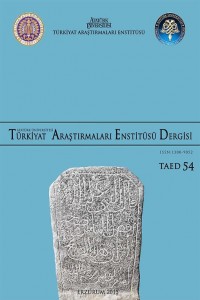Abstract
Yûsuf u Zelîhâ Masnavi, compiled by Hamdullah Hamdî in 15th century, is the first literary work carrying value of the Anatolian area. It is possible to see the characteristics of classical Ottoman Turkish as well as the qualities of Old Anatolian Turkish in terms of language in masnavi. In particular, the use of the expression patterns concerning Arabic and Persian, the verses and hadiths with the ways concerning these languages is available. One of these uses is the phrase “ﻩﺍﻭﺜﻣ ﻰﻣﺮﻛﺍ”. In this study, a different approach of reading and interpretation has been demonstrated opposed to the “egri mi meŝvāh” assessment made on the relevant phrase before and the “ekrimį meŝvāh” result has been reached
References
- Feyizli, H. T. (2010). Feyzü’l-Furkân Kur’ân-ı Kerîm ve açıklamalı meali. İstanbul: Server Yayıncılık.
- Gibb, E. J. W. (1967). A history of Ottoman poetry. C II. (2. bs.). Londra.
- Gözütok, A. (2000). Divan şiirinin dil yönünden bazı özellikleri. Atatürk Üniversitesi Türkiyat Araştırmaları Enstitüsü Dergisi, 14.
- Günday, H. ve Şahin, Ş. (2011). Arapça Dilbilgisi (Sarf Bilgisi). İstanbul: Alfa Yayıncılık.
- Kanar, M. (2009). Arapça-Türkçe sözlük. İstanbul: Say Yayınları.
- Onur, N. (1982). Hamdullah Hamdî, Yûsuf u Züleyhâ: inceleme-metin. Yayımlanmamış doktora tezi, Erzurum: Atatürk Üniversitesi Edebiyat Fakültesi.
- Onur, N. (1991). Yûsuf u Züleyhâ (metin). Ankara: Akçağ Yayınları.
- Öztürk, Z. (1993). Hamdullah Hamdi’nin Yusuf ile Zeliha mesnevisinde tipler ve motifler. Yayımlanmamış doktora tezi, İstanbul: İstanbul Üniversitesi Sosyal Bilimler Enstitüsü.
- Öztürk, Z. (2001). Hamdullah Hamdî’nin Yûsuf ve Zelîhâ mesnevîsi giriş, metin, inceleme ve tıpkıbasım. C I, Harvard: Doğu Dilleri ve Edebiyatlarının Kaynakları 48.
- Tulum, M. (2000). Tarihî metin çalışmalarında usul Menâkıbu’l-Kudsiyye üzerinde bir deneme. İstanbul: Deniz Kitabevi.
- Üstün, M. C. (2014). Hamdullah Hamdî’nin Yûsuf u Zelîhâ mesnevisi (gramer-metin-dizin). Yayımlanmamış doktora tezi, Erzurum: Atatürk Üniversitesi Sosyal Bilimler Enstitüsü.
- Yazır, E. H. (2013). Hak dini Kur’an dili tefsiri. C V. Ankara: Akçağ Yayınları. (Sadeleştiren: Sadık Kılıç, Lütfullah Cebeci, Orhan Atalay).
- http://www.mealler.org/Kelime.aspx?id=10929 / 02.12.2014
Abstract
15. yüzyılda Hamdullah Hamdî tarafından telif edilen Yûsuf u Zelîhâ Mesnevisi Anadolu sahasının ilk edebî değer taşıyan eseridir. Mesnevide dil açısından Eski Anadolu Türkçesi niteliklerinin yanı sıra Klasik Osmanlı Türkçesine ait özellikleri de görmek mümkündür. Özellikle Arapça ve Farsçaya ait kalıp ifadelerin, ayet ve hadislerin bu dillere ait şekillerle kullanımı söz konusudur. Bu kullanımlardan birisi de “اكرمىمثواه” ibaresidir. Bu çlışada, ilgili ibare üerine daha öce yapıan “egri mi meŝvā” değrlendirmesine karşıfarklıbir okuma ve anlamlandıma yaklaşıısergilenmişve “ekrimįmeŝvā” sonucuna ulaşımışı.
Keywords
References
- Feyizli, H. T. (2010). Feyzü’l-Furkân Kur’ân-ı Kerîm ve açıklamalı meali. İstanbul: Server Yayıncılık.
- Gibb, E. J. W. (1967). A history of Ottoman poetry. C II. (2. bs.). Londra.
- Gözütok, A. (2000). Divan şiirinin dil yönünden bazı özellikleri. Atatürk Üniversitesi Türkiyat Araştırmaları Enstitüsü Dergisi, 14.
- Günday, H. ve Şahin, Ş. (2011). Arapça Dilbilgisi (Sarf Bilgisi). İstanbul: Alfa Yayıncılık.
- Kanar, M. (2009). Arapça-Türkçe sözlük. İstanbul: Say Yayınları.
- Onur, N. (1982). Hamdullah Hamdî, Yûsuf u Züleyhâ: inceleme-metin. Yayımlanmamış doktora tezi, Erzurum: Atatürk Üniversitesi Edebiyat Fakültesi.
- Onur, N. (1991). Yûsuf u Züleyhâ (metin). Ankara: Akçağ Yayınları.
- Öztürk, Z. (1993). Hamdullah Hamdi’nin Yusuf ile Zeliha mesnevisinde tipler ve motifler. Yayımlanmamış doktora tezi, İstanbul: İstanbul Üniversitesi Sosyal Bilimler Enstitüsü.
- Öztürk, Z. (2001). Hamdullah Hamdî’nin Yûsuf ve Zelîhâ mesnevîsi giriş, metin, inceleme ve tıpkıbasım. C I, Harvard: Doğu Dilleri ve Edebiyatlarının Kaynakları 48.
- Tulum, M. (2000). Tarihî metin çalışmalarında usul Menâkıbu’l-Kudsiyye üzerinde bir deneme. İstanbul: Deniz Kitabevi.
- Üstün, M. C. (2014). Hamdullah Hamdî’nin Yûsuf u Zelîhâ mesnevisi (gramer-metin-dizin). Yayımlanmamış doktora tezi, Erzurum: Atatürk Üniversitesi Sosyal Bilimler Enstitüsü.
- Yazır, E. H. (2013). Hak dini Kur’an dili tefsiri. C V. Ankara: Akçağ Yayınları. (Sadeleştiren: Sadık Kılıç, Lütfullah Cebeci, Orhan Atalay).
- http://www.mealler.org/Kelime.aspx?id=10929 / 02.12.2014
Details
| Primary Language | Turkish |
|---|---|
| Journal Section | Makaleler |
| Authors | |
| Publication Date | July 30, 2015 |
| Published in Issue | Year 2015 Issue: 54 |


